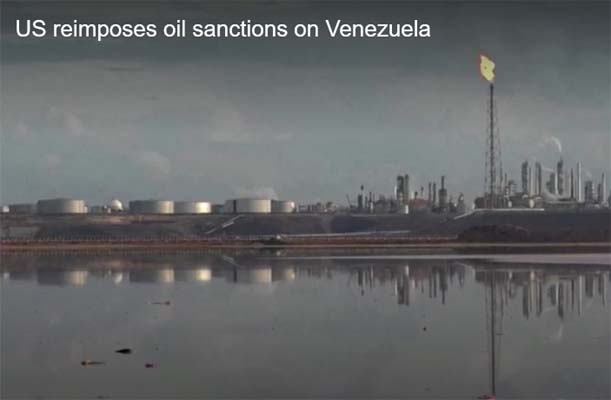
Marianna Parraga and Deisy Buitrago, Reuters
HOUSTON/CARACAS
EnergiesNet.com 04 18 2024
Venezuela’s loss of a key U.S. license that allowed it to export oil to markets around the world and secure investment is expected to hit the volume and quality of its crude and fuel sales while prompting a flurry of requests for individual U.S deal authorizations.
U.S. officials had warned that absent progress by President Nicolas Maduro’s administration on implementing an electoral roadmap agreed last year, the U.S. would not renew license 44, which since October has eased oil sanctions in place for the last five years.
On Wednesday, the Treasury gave companies 45 days to wind down pending transactions, particularly crude and fuel sales, through a more restrictive license.
It also said it would process specific authorization requests for business with Venezuela, a commitment Venezuelan officials said they expect the U.S. to honor. Many companies have waited for years to have energy deals involving Venezuela approved by Washington.
But the Treasury also explained that “entering into new business, including new investment that was previously authorized under license 44, will not be considered wind-down activity,” casting doubts on what type of transactions will be allowed.
Authorizations previously granted to oil firms including Chevron (CVX.N), Repsol (REP.MC) and Eni (ENI.MI) were not withdrawn, which secures Venezuela’s oil flows to the United States and Europe.
POLITICAL MOVES
The withdrawal of the most significant element of U.S. sanctions relief marks a major step back from President Joe Biden’s policy of re-engagement with Maduro.
However, it stops short of a return to the “maximum pressure” campaign waged under former President Donald Trump and could change depending on progress towards the election in the coming months.
Venezuela’s opposition is negotiating to choose its candidate for the July 28 presidential election, after both the winner of its primary and her alternate were prevented from registering.
The license had allowed Venezuela’s state company PDVSA to expand exports to pre-pandemic levels, improve cash flow and secure imports of diluents and fuel for the domestic market.
Under a separate authorization, about one-fifth of Venezuela’s exports are now sent by Chevron to the U.S. PDVSA and the company have begun talks to expand one of its joint ventures’ areas.
Other project expansions are expected to be green-lit by Venezuelan authorities before the 45-day wind down period, oil minister Pedro Tellechea said on Wednesday.
RUSHING TO TAKE CARGOES
In March, PDVSA’s oil exports climbed to some 900,000 barrels per day (bpd), their highest level in four years as customers rushed to complete purchases ahead of the expiration. But the backlog of tankers waiting to load at Venezuelan ports has not eased significantly, shipping data showed.
The six weeks granted by the U.S. to complete transactions might not be enough to resolve the bottleneck entirely, forcing some oil importers to apply for specific licenses, traders said.
Under the previous license and separate authorizations, Venezuela’s crude production expanded to 874,000 bpd in March, and it added two operational drilling rigs.
Without the license, PDVSA is expected to resort again to little known intermediaries to sell its oil under price discounts, mainly to Asia, unless enough U.S. individual authorizations are issued, experts said.
PDVSA’s finances, eroded by five years of sanctions, will also take a new hit, limiting access to hard currency needed for affording everything from labor to procurement.
Reporting by Marianna Parraga in Houston, Matt Spetalnick and Daphne Psaledakis in Washington, and Deisy Buitrago in Caracas
reuters.com 04 18 2024












